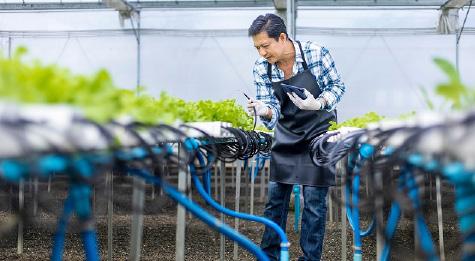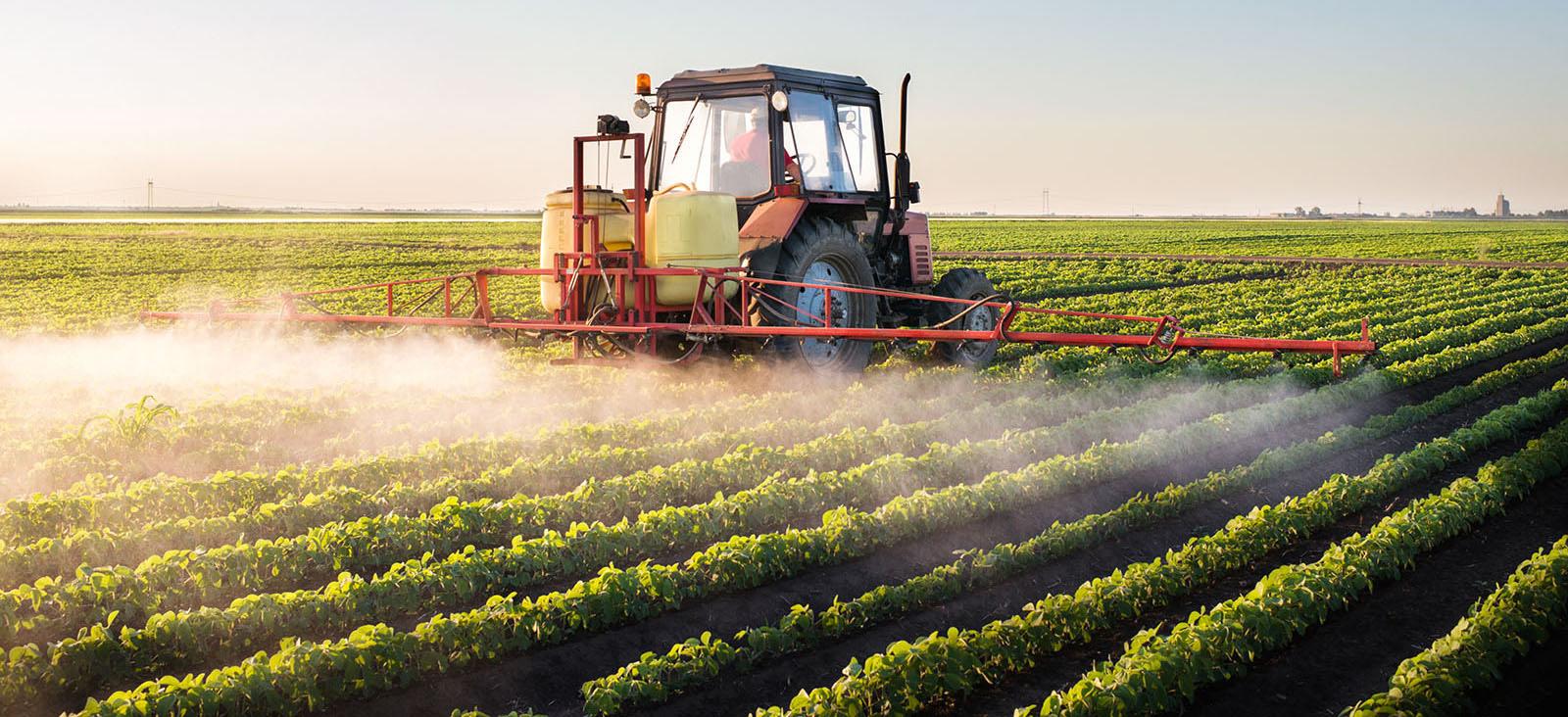
5 minute read
Why family farmers need greater access to technology
With new technologies cropping up, family farming – one of the world’s oldest economic activities – is evolving to harness emerging opportunities for productivity and sustainability gains.
Family-owned farms make up around four fifths of Earth’s farmland and are responsible for over 80% of global food production in value terms, according to the UN Food and Agriculture Organization.
Advertisement
Despite producing much of what we eat – paradoxically – family farmers, many operating on a small scale, face hunger and poverty, especially in developing countries.
A global action plan launched in
The opening of this A&ES laboratory, in addition to Azelis’ Pharmaceutical & Healthcare, Personal Care, Food & Nutrition and Coatings, Adhesives, Sealants & Elastomers (CASE) laboratories in India, allows Azelis India to deliver high-quality technical solutions to customers and principals across a range of industries.
“We are thrilled to open this new laboratory and expand our agrochemical capabilities to better serve our customers and principals.
By offering support across all stages of the formulation development process, we demonstrate how Azelis provides value-adding services in addition to our extensive portfolio of products. Our commitment to innovation has always been at the core of our business, and this new laboratory demonstrates our promise to continuously invest in expanding our innovation capabilities.”
2019 to shore up support for family farmers in a rapidly changing world highlighted the need to empower family farmers with technology and tailored innovations that meet their needs.
“Technology boosts family farming by enhancing agricultural productivity and livelihoods and promoting environmentally friendly solutions to agriculture,” said Clovis Freire, who leads UNCTAD’s work on technology and innovation policy research.

“Increasing the access of young farmers to technologies can expand rural employment opportunities and enhance the sustainability of family farming,” he added.
Technology as a game changer for family farming
Technology strengthens all four dimensions of food security –availability, access, utilization and stability, according to experts.
Genetic modification, for instance, can increase food supply by speeding up the process of creating new varieties with desired traits.
Agro-processing technologies reduce post-harvest losses and improve the quality of processed products, making food more accessible.
Biofortification, known for improving nutrition, helps mitigate human micronutrient deficiency.
Drones and satellites, used for territory surveillance, mapping and crop health monitoring, contribute to more stable agriculture production.
Promoting cooperation and knowledge sharing
Backed by the UN Commission on Science and Technology for Development, to which UNCTAD provides substantive support, various South-South cooperation initiatives – from a science, technology and innovation perspective – are underway to bolster developing countries’ technological capacities.
During a recent workshop on the use of advanced technologies for family agriculture, UNCTAD and its partners jointly launched an industrial innovation cluster of agribusiness, based in Petrolina, Brazil.
The cluster aims at helping Brazilian family farmers tap technology to raise productivity, generate more jobs and make their farming practices more sustainable.
The workshop brought together participants from 14 developing nations, who shared experiences on cooperative practices, technology assessment and the environmental benefits of precision farming – where modern technologies, such as data and digital tools, help monitor and optimize agricultural operations.
How family farmers benefit from technology
Kenya, for example, is carrying out a precision agriculture pilot project using satellite technology to analyse soil carbon and fertility. It includes advising smallholder farmers – through mobile apps and text messages – on when to plant and how much fertilizer to apply.
In Seychelles, farmers are trained to use fertigation technology –combining soluble fertilizers with micro-irrigation techniques – to improve crop quality while reducing energy consumption.
Saudi Arabia, meanwhile, enables farming families to add more value to agricultural products by
Siemens to equip Continental tire factories with automation technology
providing modern machinery and production centres, which convert raw materials to primary and secondary products such as wool, dry fruits and cosmetic oils.
And Uruguay’s ministry of livestock, agriculture and fisheries is designing a digital inclusion strategy targeting rural populations, particularly women farmers.
What policymakers need to do
To narrow the tech gap for family farmers, UNCTAD calls for greater investments – nationally and globally – in research and development to make technologies more affordable, accessible and user-friendly.
Skills training and capacity-building are key to enabling technology adoption by smallholder farmers. UNCTAD also underscores the need for adequate infrastructure – such as farming equipment, internet broadband and waste management facilities – to reach family farmers, particularly those living in rural areas.
Also, promoting knowledge transfer and international cooperation is crucial to fostering inclusive transformation of family farming, as well as resilient agrifood systems worldwide.
ontinental’s tire division and Siemens have signed a strategic supplier agreement.

As Siemens announces on the sidelines of the Tire Expo trade fair in Hannover (Germany), the company will supply automation and drive technology for Continental’s tire factories worldwide in its capacity as a preferred supplier.
The aim of the cooperation is to further optimize Continental’s global tire production with innovative control and automation technology. As part of the agreement, standards will be established which will help Continental make its production machinery even more efficient throughout their lifecycles.
“Tires connect cars and roads,” says Cedrik Neike, member of the Managing Board at Siemens AG and CEO
Digital Industries.
“Without modern and innovative tires, we cannot reach our safety, efficiency, and sustainability targets. That’s why Continental Tires and Siemens have formed a close partnership, one that we are now expanding.”
To drive standardization, Continental will purchase its automation systems and large parts of its drive technology for new machines and developments from Siemens.
The supplier will equip Continental tire factories with Simatic controllers, I/O systems, WinCC Unified operator control units, and industrial PCs. Siemens will also train the relevant employees at Continental tire factories in TIA Portal.
The high degree of standardization will be even further developed, especially where software is concerned. The Siemens Tire Library, a software library for standardizing the control of sensors and actuators, will also provide support on this matter.
This will simplify mechanical engineering as well as maintenance for machines and equipment for Continental and its machine suppliers as well. Standardization also enables the machines to operate uniformly, regardless of machine supplier.
In addition, the use of these digital technologies promotes sustainable production, a key concern in the tire industry. In this regard, Siemens offers particularly long lifecycles for the hardware products to be used in the future and enables software and hardware innovations to be easily integrated throughout the machines’ lifecycles.
Siemens also provides technical support and is working on long-term availability of spare parts.
Siemens and Continental Tires have worked together in the past around digitalization. One example is the digital twin of an extrusion plant, which is used, among other things, for virtual commissioning. Continental Tires also uses Siemens edge technology and cloud hosting for Mendix applications.
“Without modern and innovative tires, we cannot reach our safety, efficiency, and sustainability targets. That’s why Continental Tires and Siemens have formed a close partnership, one that we are now expanding.”
Farm Equipment sector sells 33,622 Units in India during March 2023
Exports) during March 2023 were at 35,014 units, as against 29,763 units for the same period last year. Exports for the month stood at 1,392 units.
The company clocked its highest ever annual sale of 4,07,545 units (Domestic + Exports) in FY’23.
Mahindra & Mahindra Ltd.’s Farm Equipment Sector (FES), part of the Mahindra Group, today announced its tractor sales numbers for March 2023.

Domestic sales in March 2023 were at 33,622 units, as against 28,112 units during March 2022.
Total tractor sales (Domestic +
Commenting on the performance, Hemant Sikka, President – Farm Equipment Sector, Mahindra & Mahindra Ltd. said, “We have sold 33,622 tractors in the domestic market during March 2023, a growth of 20% over last year. Increase in crop output, mandi prices staying firm, Government support for increase in MSP for major crops and increase in wages under MGNREGA scheme will help improve the financial security of rural households and boost tractor demand in the coming months. In the exports market, we have sold 1,392 tractors.”









